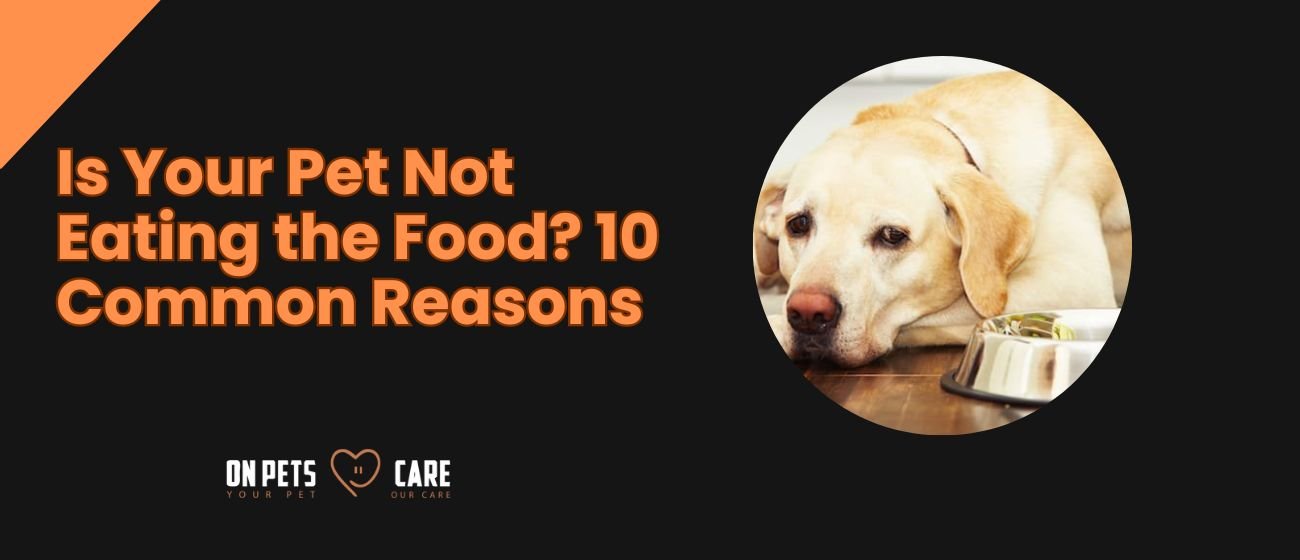Is Your Pet Not Eating the Food? 10 Common Reasons
Having a pet is a rewarding experience, but it can be worrisome when your furry friend refuses to eat. When your Pet Not Eating the Food it can be a sign of an underlying issue. In this article, we’ll delve into the primary keyword, Pet foods and explore the secondary keyword, Reasons why pets are not eating food, to help you understand why your pet might be turning their nose up at their meals. We’ll also touch upon the tertiary keyword, Onpets Care, to guide you in providing the best care for your beloved companion.
Top Reasons why Pet Not Eating the Food:
Dental Problems and Pet foods
One common reason for a pet’s loss of appetite is dental issues. Just like humans, pets can suffer from toothaches, gum infections, or broken teeth that make eating painful. If your pet is avoiding their food, it might be time for a dental check-up.
Illness or Infection
Pets can fall ill, just like we do. Infections, viruses, or underlying health conditions can lead to loss of appetite. If your pet seems lethargic and disinterested in food, it’s crucial to consult a veterinarian to rule out any underlying health problems.
Dietary Changes
Sometimes, a simple change in diet can be the culprit. Introducing a new brand or type of pet food can be met with resistance. Gradual transitions and sticking to familiar brands can help prevent this issue.
Stress and Anxiety
Pets can be affected by stress and anxiety, which can impact their appetite. Changes in their environment, new additions to the family, or even loud noises can trigger anxiety in pets. Creating a calm and secure environment can help ease their anxiety and restore their appetite.
Spoiled Pet Foods
Check the quality of the pet food you’re providing. Spoiled or expired food can make pets refuse to eat. Always check the expiration date and ensure proper storage to keep the food fresh and enticing.
Feeding Schedule
Inconsistency in your pet’s feeding schedule can lead to irregular eating habits. Establishing a regular feeding routine can help your pet know when to expect their meals, making them more likely to eat when it’s time.
Allergies
Food allergies can cause discomfort in pets and result in them avoiding certain foods. Consult with your vet to determine if allergies might be the reason behind your pet’s food rejection.
Dental Hygiene
Besides dental problems, poor dental hygiene can lead to bad breath and an aversion to food. Regularly brushing your pet’s teeth and providing dental chews can help maintain their oral health.
Environmental Factors
External factors such as temperature, humidity, and the presence of other animals can affect your pet’s appetite. Ensure your pet’s eating area is comfortable and free from disturbances.
Aging
As pets age, their dietary needs change. Senior pets might require different types of food. Consult your veterinarian to adjust your diet accordingly.
Medications
Certain medications can affect a pet’s appetite as a side effect. If your pet has been prescribed medication, discuss any potential impacts on their appetite with your vet.
Overfeeding
On the flip side, overfeeding can also lead to appetite loss. Ensure you follow the recommended portion sizes to avoid overwhelming your pet’s stomach.
Behavioral Issues
Behavioral problems, such as food guarding or pickiness, can cause pets to reject their meals. Training and positive reinforcement can help address these issues.
Food Preferences
Just like humans, pets have preferences. Experiment with different flavors and textures to find your pet’s favorite food.
The Importance of Onpets Care regarding pet foods:
When it comes to your pet’s well-being, Onpets Care is paramount. Providing proper nutrition, regular vet check-ups and a loving environment are all part of ensuring your furry companion’s happiness and health. Remember, pets thrive on routine and affection, so make sure to shower them with love and attention daily. Their joy and contentment are the best rewards for your dedication to Onpets Care.
Conclusion
It can be concerning when your pet refuses to eat, but there are various reasons behind this behavior. By considering factors like dental health, illness, dietary changes, and stress, you can work towards a solution. Remember, if the problem persists, consult your veterinarian for professional guidance.
FAQs (Frequently Asked Questions)
How do I know if my pet’s loss of appetite is a serious issue?
If your pet refuses food for more than 24 hours or shows other concerning symptoms like lethargy or vomiting, consult your veterinarian immediately.
Can I change my pet’s food abruptly?
It’s best to transition your pet to a new food gradually over a week to avoid digestive upset.
What should I do if my pet has dental problems?
Schedule a dental check-up with your veterinarian, who can recommend appropriate treatment options.
Are there specific foods that can help boost my pet’s appetite?
Consult your vet for recommendations, as they can suggest specialized diets or supplements.
How can I reduce my pet’s anxiety related to eating?
Creating a quiet and comfortable eating environment, along with positive reinforcement, can help reduce mealtime anxiety in pets.



